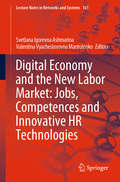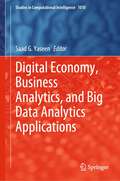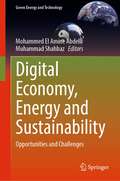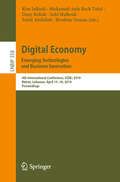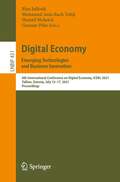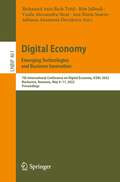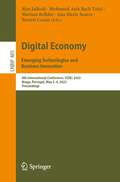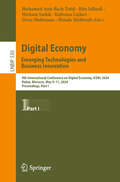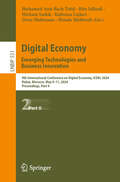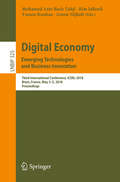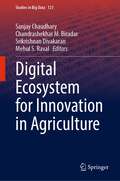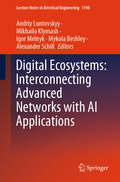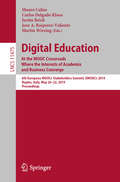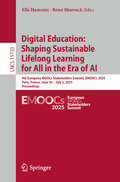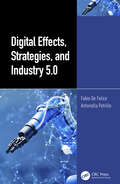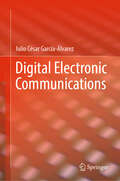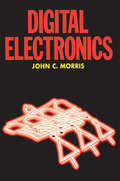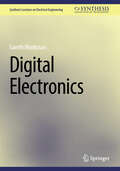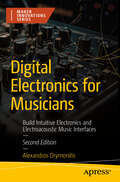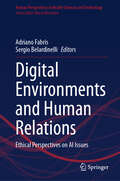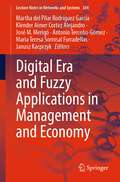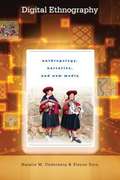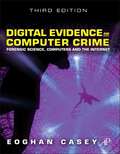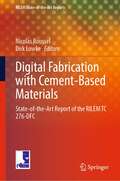- Table View
- List View
Digital Economy and the New Labor Market: Jobs, Competences and Innovative HR Technologies (Lecture Notes in Networks and Systems #161)
by Svetlana Igorevna Ashmarina Valentina Vyacheslavovna MantulenkoThis proceedings book contains papers presented at the XI International Online Forum named after A.Ya. Kibanov “Innovative Personnel Management,”, which took place in Moscow, Russian Federation, 15th April–5th May 2020. Organized by Moscow State University of Management, the Forum chiefly focused on HR management issues under conditions of active penetration of IT into the management and economic sphere. The authors of contributions included in this book examine both the theoretical basis for the development of the labor landscape in our digital future, and specific practical issues related to the real business practice. The book includes results of multidisciplinary studies on the following issues: employment and the labor market: a future perspective; current trends of HR management development in digital conditions; IT for creating healthy work conditions; digital transformation and new architecture of the labor market; innovative, strategic HR management and HR analytics; leadership, etc. The book consists of six parts corresponding to thematic areas of the Forum. The first part deals with the transformation of the labor market under the influence of digitalization and international economic relations. The second part is devoted to the analysis of the current changes in the HR management caused by digitalization, as well as issues of creating a healthy work environment and managing well-being with information technology. New architecture of the labor market is considered in the third part of the book in the face of the global uncertainty and the application of digital technology in entrepreneurial activities. The fourth part investigates innovative approaches to the personnel development: from resource management to capacity management. The fifth part presents strategic HR management and HR analytics in the context of current macro-calls. And finally, the sixth part is aimed at considering leadership aspects and relations between investments in the human capital and needed business results. This book is a combination of different scientific opinions and research works of scholars from different countries and regions, offering us a colorful picture of the future labor landscape: jobs, competences and skills that will be in demand.
Digital Economy, Business Analytics, and Big Data Analytics Applications (Studies in Computational Intelligence #1010)
by Saad G. YaseenThis book is about turning data into smart decisions, knowledge into wisdom and business into business intelligence and insight. It explores diverse paradigms, methodologies, models, tools and techniques of the emerging knowledge domain of digitalized business analytics applications.The book covers almost every crucial aspect of applied artificial intelligence in business, smart mobile and digital services in business administration, marketing, accounting, logistics, finance and IT management.This book aids researchers, practitioners and decisions makers to gain enough knowledge and insight on how to effectively leverage data into competitive intelligence.
Digital Economy, Energy and Sustainability: Opportunities and Challenges (Green Energy and Technology)
by Muhammad Shahbaz Mohammed El Amine AbdelliThis book looks at how digital economy can help energy businesses to meet their sustainability goals. It will further generates a new debate among policymakers about encouraging green technologies to reduce global carbon emissions.Our modern society requires a long-term, sustainable, and secure energy supply that not only generates and preserves renewable energy. It is also creating universal intelligent machines for power systems, and vital infrastructure is considered in terms of digital economy requirements. The idea of sharing information is an essential principle of sustainable thinking. In such instances, open internet and data access are required to enable any human being to acquire knowledge. Furthermore, the energy industry is changing worldwide, necessitating the consideration of potential implications and modifications. Thus, its most distinguishing feature is moving from a centrally organized system to one with many market players. Consequently, information and communication technologies and human growth have significant main and interactive effects on environmental sustainability. Simultaneously, energy industry is a major player in resolving the digital economy’s development issues.
Digital Economy. Emerging Technologies and Business Innovation: 4th International Conference, ICDEc 2019, Beirut, Lebanon, April 15–18, 2019, Proceedings (Lecture Notes in Business Information Processing #358)
by Rim Jallouli Mohamed Anis Bach Tobji Deny Bélisle Sehl Mellouli Farid Abdallah Ibrahim OsmanThis book constitutes the refereed proceedings of the 4th International Conference on Digital Economy, ICDEc 2019, held in Beirut, Lebanon, in April 2019. The conference was founded in 2016 to discuss innovative research and projects related to the support role of Information System Technologies in the digital transformation process, business innovation and e-commerce. The 31 papers presented in this volume were carefully reviewed and selected from 89 submissions. The theme of ICDEc 2019 was “Digital Economy: Emerging Technologies and Business Innovation”. The papers were organized in topical sections named: digital transformation; e-finance; social media communication; intelligent systems; e-commerce and business analytics; e-learning and cloud education; e-commerce and digital economy; data science; digital marketing; and digital business model.
Digital Economy. Emerging Technologies and Business Innovation: 6th International Conference on Digital Economy, ICDEc 2021, Tallinn, Estonia, July 15–17, 2021, Proceedings (Lecture Notes in Business Information Processing #431)
by Rim Jallouli Mohamed Anis Bach Tobji Hamid Mcheick Gunnar PihoThis book constitutes the proceedings of the 6th International Conference on Digital Economy, ICDEc 2021. The conference was held during July 15-17, 2021. It was initially planned to take place in Tallin, Estonia, but changed to a virtual event due to the COVID-19 pandemic.The 18 papers presented in this volume were carefully reviewed and selected from 51 submissions. They were organized in topical sections as follows: Digital strategies; virtual communities; digital assets and blockchain technology; artificial intelligence and data science; online education; digital transformation; and augmented reality and IOT.
Digital Economy. Emerging Technologies and Business Innovation: 7th International Conference on Digital Economy, ICDEc 2022, Bucharest, Romania, May 9–11, 2022, Proceedings (Lecture Notes in Business Information Processing #461)
by Rim Jallouli Mohamed Anis Bach Tobji Vasile Alecsandru Strat Ana Maria Soares Adriana Anamaria DavidescuThis book constitutes the proceedings of the 7th International Conference on Digital Economy, ICDEc 2022, which took place in Bucharest, Romania, in May 2022. The 15 full papers included in this volume were carefully reviewed and selected from 44 submissions. They were organized in topical sections as follows: Digitalization and COVID 19; digital business models for education and healthcare; IT user behavior and satisfaction; digital marketing; and digital transformation.
Digital Economy. Emerging Technologies and Business Innovation: 8th International Conference, ICDEc 2023, Braga, Portugal, May 2–4, 2023, Proceedings (Lecture Notes in Business Information Processing #485)
by Rim Jallouli Mohamed Anis Bach Tobji Ana Maria Soares Beatriz Casais Meriam BelkhirThis book constitutes the proceedings of the 8th International Conference on Digital Economy, ICDEc 2023, which took place in Braga, Portugal, in May 2023.The 26 full papers included in this volume were carefully reviewed and selected from 72 submissions. They were organized in topical sections as follows: Digital transformation; e-learning and digital competencies; digital marketing and artificial intelligence; e-finance and digital assets; digital marketing and data analytics; digital economy; online session.
Digital Economy. Emerging Technologies and Business Innovation: 9th International Conference on Digital Economy, ICDEc 2024, Rabat, Morocco, May 9–11, 2024, Proceedings, Part I (Lecture Notes in Business Information Processing #530)
by Rim Jallouli Mohamed Anis Bach Tobji Hicham Sadok Kaltoum Lajfari Driss Mafamane Houda MahboubThis book constitutes the proceedings of the 9th International Conference on Digital Economy, ICDEc 2024, held in Rabat, Morocco, during May 9-11, 2024. The 43 full papers were carefully reviewed and selected from 117 submissions. They were categorized under the topical sections as follows: Part I: Digital Transformation, Digital Economy and Investment, Artificial Intelligence and E-learning, E-commerce and Social Media Marketing, Exploring the Nexus of Digital and Sustainable Economies in Developing States and Digital Business Models. Part II: Application of Machine Learning for Business, Digital Technologies and Innovative Management, Social Networks and Information Technologies, Digital Economy in Emerging Countries Mobile Banking and Digital Assets, Online Session.
Digital Economy. Emerging Technologies and Business Innovation: 9th International Conference on Digital Economy, ICDEc 2024, Rabat, Morocco, May 9–11, 2024, Proceedings, Part II (Lecture Notes in Business Information Processing #531)
by Rim Jallouli Mohamed Anis Bach Tobji Hicham Sadok Kaltoum Lajfari Driss Mafamane Houda MahboubThis book constitutes the proceedings of the 9th International Conference on Digital Economy, ICDEc 2024, held in Rabat, Morocco, during May 9-11, 2024. The 43 full papers were carefully reviewed and selected from 117 submissions. They were categorized under the topical sections as follows: Part I: Digital Transformation, Digital Economy and Investment, Artificial Intelligence and E-learning, E-commerce and Social Media Marketing, Exploring the Nexus of Digital and Sustainable Economies in Developing States and Digital Business Models. Part II: Application of Machine Learning for Business, Digital Technologies and Innovative Management, Social Networks and Information Technologies, Digital Economy in Emerging Countries Mobile Banking and Digital Assets, Online Session.
Digital Economy. Emerging Technologies and Business Innovation: Third International Conference, ICDEc 2018, Brest, France, May 3-5, 2018, Proceedings (Lecture Notes in Business Information Processing #325)
by Anton Nijholt Rim Jallouli Mohamed Anis Bach Tobji Yamen KoubaaThis book constitutes the refereed proceedings of the Third International Conference on Digital Economy, ICDEc 2018, held in Brest, France in May 2018. The conference was founded in 2016 to discuss innovative research and projects related to the support role of Information System Technologies in the digital transformation process, business innovation and e-commerce. The 15 papers presented in this volume were carefully reviewed and selected from 41 submissions. The theme of ICDEc 2018 was “Digital Economy: Emerging Technologies and Business Innovation”. The papers were organized in topical sections named: digital marketing; e-banking and competitive intelligence; information system technologies; and e-learning, e-government and e-health.
Digital Ecosystem for Innovation in Agriculture (Studies in Big Data #121)
by Sanjay Chaudhary Mehul S. Raval Chandrashekhar M. Biradar Srikrishnan DivakaranThis book presents the latest findings in the areas of digital ecosystem for innovation in agriculture. The book is organized into two sections with thirteen chapters dealing with specialized areas. It provides the reader with an overview of the frameworks and technologies involved in the digitalization of agriculture, as well as the data processing methods, decision-making processes, and innovative services/applications for enabling digital transformations in agriculture. The chapters are written by experts sharing their experiences in lucid language through case studies, suitable illustrations, and tables. The contents have been designed to fulfill the needs of geospatial, data science, agricultural, and environmental sciences of universities, agricultural universities, technological universities, research institutes, and academic colleges worldwide. It helps the planners, policymakers, and extension scientists plan and sustainably manage agriculture and natural resources.
Digital Ecosystems: Interconnecting Advanced Networks with AI Applications (Lecture Notes in Electrical Engineering #1198)
by Andriy Luntovskyy Alexander Schill Mikhailo Klymash Mykola Beshley Igor MelnykThis book covers several cutting-edge topics and provides a direct follow-up to former publications such as “Intent-based Networking” and “Emerging Networking”, bringing together the latest network technologies and advanced AI applications. Typical subjects include 5G/6G, clouds, fog, leading-edge LLMs, large-scale distributed environments with specific QoS requirements for IoT, robots, machine and deep learning, chatbots, and further AI solutions. The highly promising combination of smart applications, network infrastructure, and AI represents a unique mix of real synergy. Special aspects of current importance such as energy efficiency, reliability, sustainability, security and privacy, telemedicine, e-learning, and image recognition are addressed too. The book is suitable for students, professors, and advanced lecturers for networking, system architecture, and applied AI. Moreover, it serves as a basis for research and inspiration for interested professionals looking for new challenges.
Digital Education: 6th European MOOCs Stakeholders Summit, EMOOCs 2019, Naples, Italy, May 20–22, 2019, Proceedings (Lecture Notes in Computer Science #11475)
by Carlos Delgado Kloos Mauro Calise Justin Reich Jose A. Ruiperez-Valiente Martin WirsingThis book constitutes the proceedings of the 6th European Conference on Massive Open Online Courses, EMOOCs 2019, held in Naples, Italy, in May 2019. The 15 full and 6 short papers presented in this volume were carefully reviewed and selected from 42 submissions. Massive Open Online Courses (MOOCs) have marked a milestone in the use of technology for education. The reach, potential, and possibilities of EMOOCs are immense. But they are not only restricted to global outreach: the same technology can be used to improve teaching on campus and training inside companies and institutions. The chapter 'Goal Setting and Striving in MOOCs. A Peek inside the Black Box of Learner Behaviour' is open access under a CC BY 4.0 license at link.springer.com.
Digital Education: 9th European MOOCs Stakeholders Summit, EMOOCs 2025, Paris, France, June 30 – July 2, 2025, Proceedings (Lecture Notes in Computer Science #15733)
by Ella Hamonic Rémi SharrockThis open access book constitutes the proceedings of the 9th European MOOCs Stakeholders Summit, EMOOCs 2025, which took place in Paris, France, during June 30-July 2, 2025. The 20 full papers included in this book were carefully reviewed and selected from 79 submissions. They deal with the ongoing transformation and critical challenges in online education — particularly in the context of artificial intelligence (AI) and sustainable lifelong learning.
Digital Effects, Strategies, and Industry 5.0 ("International Perspectives on Science, Culture and Society")
by Antonella Petrillo Fabio De FeliceThis book discusses the increase in global competitiveness which challenges the manufacturing market to integrate design and product in order to improve quality and process. The book goes on to examine digital manufacturing technologies and critiques how they are transforming every link of the manufacturing value chain.Digital Effects, Strategies, and Industry 5.0 presents many different tooling processes that digital manufacturing utilizes such as artificial intelligence, automation and robotics, additive technology, human-machine interaction, and IoT. Digital manufacturing technologies and how they can transform every link of the manufacturing value chain, from research and development, supply chain, and factory operations to marketing, sales, and service, are examined within the book. Also included is coverage of Industry 5.0, the future, and how it is already starting a trend of change processes directed towards closer cooperation between man and machine, as well as systematic prevention of waste and wasting including industrial upcycling, along with case studies.This book is aimed at professionals and students in the areas of manufacturing and processing, productivity improvement, environmental, engineering management, and information management.
Digital Electronic Communications
by Julio César García-ÁlvarezThis book provides the basic concepts of electronic digital communication, applied to professional practice in communications engineering. The book begins with basic concepts of information theory and explains the need for digital communications, continuing with the basic schemes of digital communication prior to multiplexing, which applies to current digital communication networks, such as LTE, 5G and 6G. The book is intended for researchers, professionals, and second-year students of electrical engineering, electronics or telecommunications. It can also be useful to students in computer science, engineering physics or other disciplines who develop projects involving electronic communication systems.
Digital Electronics
by John MorrisAn essential companion to John C Morris's 'Analogue Electronics', this clear and accessible text is designed for electronics students, teachers and enthusiasts who already have a basic understanding of electronics, and who wish to develop their knowledge of digital techniques and applications. Employing a discovery-based approach, the author covers fundamental theory before going on to develop an appreciation of logic networks, integrated circuit applications and analogue-digital conversion. A section on digital fault finding and useful ic data sheets completes the book.
Digital Electronics (Synthesis Lectures on Electrical Engineering)
by Gareth MonkmanThis book introduces the basic digital components and devices, often with respect to historical events which led to these concepts, before combining them to make complete digital systems. The historical aspect is important in than many older devices were purely mechanical. This helps in understanding the basic concepts before embarking on analysis and application of modern semiconductor devices. The book covers all aspects of digital technology needed by first/second year university students. Basic devices and their combination from simple circuits to complete ALUs. Sequential concatenation of devices leads to counters, timers, registers and memory. Parallel to these subject, all mathematical aspects of Boolean algebra are covered. The book culminates in a fusion of the three main subjects resulting in the design of a basic CPU and the implementation of assembly language code. Throughout the book, reference is made to original historical devices and designs which have led (or in many cases, not) to the development of modern digital and computing systems.
Digital Electronics for Musicians: Build Intuitive Electronics and Electroacoustic Music Interfaces (Maker Innovations Series)
by Alexandros DrymonitisDive into the world of computer music and physical computing and stay ahead of the melodic curve. This book is aimed at adventurous musicians who want to learn about music programming with Arduino, sensors, and Pure Data, and how to make new interfaces and instruments with that knowledge. In this updated version, you can expect a wave of updates that bring the content in sync with the latest tech trends. The book now features revamped code and visuals throughout, all tailored to match the cutting-edge versions of Pure Data, Arduino IDE, and the powerful Raspberry Pi 5. What's even more thrilling is the integration of the Bela platform for audio enthusiasts, alongside an expanded wireless toolkit that includes both Wi-Fi and the trusty XBee. To ensure a smoother journey, there are more project-enhancing images to guide you, and a brand-new chapter dedicated to AI, based on the author's innovative neuralnet object for Pure Data, as showcased in the AIMC conference proceedings. You’ll start with the basics of the Pure Data and Arduino languages, how to incorporate sensors into your musical projects, and how to use embedded computers, like the Raspberry Pi, to create stand-alone projects. Along the way, you’ll learn how to create a variety of innovative musical projects, including an interactive glove that can be used bystringed instrumentalists or other musicians, an interactive drum set, a patch-bay matrix synthesizer, a guitar looper, a DIY theremin, and even DIY instruments that incorporate AI. If you are a musician or tinkerer who wants to explore the world of electronic and electroacoustic music, then Digital Electronics for Musicians, Second Edition is the book for you. What You Will Learn Incorporate sensors into your musical projects. Combine Arduino and Pure Data to bring the physical world to computers. Use additional libraries that extend the capabilities of the Arduino. Work with external objects in Pure Data and create your own patches from scratch. Write your own sketches with Arduino. Who This Book Is For Musicians who want to explore the world of electronic and electroacoustic music.
Digital Environments and Human Relations: Ethical Perspectives on AI Issues (Human Perspectives in Health Sciences and Technology #150)
by Adriano Fabris Sergio BelardinelliIn Digital Environments and Human Ecology: New Perspectives on AI Issues, editors and contributors embark on a multidisciplinary exploration of how artificial intelligence (AI) is reshaping the landscapes of human interactions, societal structures, and individual and collective psychologies. Discussing if and to what extent the digital environment can be considered an extension of our environment, this book investigates the profound implications of AI's integration into our daily life, emphasizing the need for a harmonious coexistence between technological advancements and human-centric values, stressing the importance of sustainability in digital development and, therefore, a renewed Human Ecology. By weaving together insights from computer science, social sciences, philosophy, and environmental studies, this book offers a comprehensive and nuanced understanding of the complex relationship between humans and technology. It serves as a vital resource for policymakers, technologists, scholars, and anyone interested in the ethical and ecological implications of digital technologies in our lives.
Digital Era and Fuzzy Applications in Management and Economy (Lecture Notes in Networks and Systems #384)
by Janusz Kacprzyk Antonio Terceño-Gómez José M. Merigó Martha del Pilar Rodríguez García Klender Aimer Cortez Alejandro Maria Teresa Sorrosal ForradellasThis book aims to contribute to the discussion about the implications of fuzzy logic, neural networks, digital era, and other intelligent techniques on organizations. This book will be very useful for academic researchers and postgraduate students aiming to introduce themselves to the field of quantitative techniques for overcoming uncertain environments and developing models to make decisions. Developments in other theories and socioeconomic and computational changes have shed light on the importance of fuzzy applications in social sciences. The treatment of uncertainty in the economic and business analysis is fundamental and requires instruments compatible with the uncertain environment of economics and business, because most of the traditional models have been overtaken by this reality when trying to make decisions with uncertain information. In the face of information technology, digitization, and uncertainty, organizations confront new opportunities and challenges. In order to take advantage of these opportunities and overcome current and future challenges, it is needed to understand the evolution of these phenomenon.
Digital Ethnography: Anthropology, Narrative, and New Media
by Natalie M. Underberg Elayne ZornDigital ethnography can be understood as a method for representing real-life cultures through storytelling in digital media. Enabling audiences to go beyond absorbing facts, computer-based storytelling allows for immersion in the experience of another culture. A guide for anyone in the social sciences who seeks to enrich ethnographic techniques, Digital Ethnography offers a groundbreaking approach that utilizes interactive components to simulate cultural narratives. Integrating insights from cultural anthropology, folklore, digital humanities, and digital heritage studies, this work brims with case studies that provide in-depth discussions of applied projects. Web links to multimedia examples are included as well, including projects, design documents, and other relevant materials related to the planning and execution of digital ethnography projects. In addition, new media tools such as database development and XML coding are explored and explained, bridging the literature on cyber-ethnography with inspiring examples such as blending cultural heritage with computer games. One of the few books in its field to address the digital divide among researchers, Digital Ethnography guides readers through the extraordinary potential for enrichment offered by technological resources, far from restricting research to quantitative methods usually associated with technology. The authors powerfully remind us that the study of culture is as much about affective traits of feeling and sensing as it is about cognition—an approach facilitated (not hindered) by the digital age.
Digital Evidence and Computer Crime: Forensic Science, Computers, and the Internet
by Eoghan CaseyDigital Evidence and Computer Crime, Third Edition, provides the knowledge necessary to uncover and use digital evidence effectively in any kind of investigation. It offers a thorough explanation of how computer networks function, how they can be involved in crimes, and how they can be used as a source of evidence. In particular, it addresses the abuse of computer networks as well as privacy and security issues on computer networks. This updated edition is organized into five parts. Part 1 is about digital forensics and covers topics ranging from the use of digital evidence in the courtroom to cybercrime law. Part 2 explores topics such as how digital investigations are conducted, handling a digital crime scene, and investigative reconstruction with digital evidence. Part 3 deals with apprehending offenders, whereas Part 4 focuses on the use of computers in digital investigation. The book concludes with Part 5, which includes the application of forensic science to networks. New to this edition are updated information on dedicated to networked Windows, Unix, and Macintosh computers, as well as Personal Digital Assistants; coverage of developments in related technology and tools; updated language for search warrant and coverage of legal developments in the US impacting computer forensics; and discussion of legislation from other countries to provide international scope. There are detailed case examples that demonstrate key concepts and give students a practical/applied understanding of the topics, along with ancillary materials that include an Instructor's Manual and PowerPoint slides. This book will prove valuable to computer forensic students and professionals, lawyers, law enforcement, and government agencies (IRS, FBI, CIA, CCIPS, etc.). - Named The 2011 Best Digital Forensics Book by InfoSec Reviews - Provides a thorough explanation of how computers & networks function, how they can be involved in crimes, and how they can be used as evidence - Features coverage of the abuse of computer networks and privacy and security issues on computer networks
Digital Exhaustion: Simple Rules for Reclaiming Your Life
by Paul LeonardiA revelatory examination of why you&’re feeling so worn out—and practical daily strategies to change your relationship with your devices.Unplugging is not a long-term solution for the stress caused by technology. If you want to keep your job, participate in society, and maintain meaningful relationships, you can&’t escape your many apps and devices.Paul Leonardi maps out an achievable path to reducing your digital exhaustion, drawing on extensive research to show how real people can use technology in healthy ways. These are realistic approaches that won&’t fragment your attention and deplete your cognitive and emotional reserves. Many of the changes are simple yet surprisingly effective, like waiting longer to respond, making sure you&’re using the right tool for your task, and being more conscious of the time and energy we allocate to our devices. He also explains the emotional traps that lead us into dysfunctional relationships with our technology, and how to escape them.With Leonardi as your guide, you can build stronger connections, be more creative and productive, and create the mental space to reclaim your energy and your life.
Digital Fabrication with Cement-Based Materials: State-of-the-Art Report of the RILEM TC 276-DFC (RILEM State-of-the-Art Reports #36)
by Nicolas Roussel Dirk LowkeThis book presents the work of the RILEM Technical Committee 276-DFC: Digital fabrication with cement-based materials. The most important outcomes of the technical committee are presented. First, a unified process classification for digital fabrication with concrete is proposed, discussed and illustrated. Then, a state of the art of the testing methods (both at a material and structural level and in the fresh and hardened state) is provided. The gathered knowledge is expected to form the foundation of some quality control procedures for fresh properties along with hardened properties and service life performance. The book will benefit academics, practitioners, industry and standardization committees interested in digital fabrication with cement-based materials.
